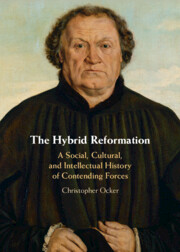Book contents
- The Hybrid Reformation
- The Hybrid Reformation
- Copyright page
- Additional material
- Dedication
- Contents
- Preface
- Part I Indifference and Ambiguity
- Part II Medieval Protestants
- Part III Interpretation beyond Borders
- 7 Erasmus and Biblical Scholasticism
- 8 A Literal Incident, a Spiritual Menace
- 9 The Trouble with Allegory
- 10 Third Forces in a Hybrid Reformation
- Bibliography
- Index
10 - Third Forces in a Hybrid Reformation
from Part III - Interpretation beyond Borders
Published online by Cambridge University Press: 30 September 2022
- The Hybrid Reformation
- The Hybrid Reformation
- Copyright page
- Additional material
- Dedication
- Contents
- Preface
- Part I Indifference and Ambiguity
- Part II Medieval Protestants
- Part III Interpretation beyond Borders
- 7 Erasmus and Biblical Scholasticism
- 8 A Literal Incident, a Spiritual Menace
- 9 The Trouble with Allegory
- 10 Third Forces in a Hybrid Reformation
- Bibliography
- Index
Summary
This concluding chapter describes the inevitability of ambiguity among everyone affected by the Reformation. It reviews historiographical trends of research since the 1970s in intellectual and social history. Comparing these trends to the benefits and shortcomings of the “confessionalization thesis,” it argues for reconsideration of the idea of third forces, adapting a concept suggested by the Austrian medievalist and public intellectual Friedrich Heer and the French Renaissance historian Thierry Wanegffelen. It finally explains how the power of third forces describes the specific hybridity of the Reformation.
Keywords
- Type
- Chapter
- Information
- The Hybrid ReformationA Social, Cultural, and Intellectual History of Contending Forces, pp. 244 - 263Publisher: Cambridge University PressPrint publication year: 2022

